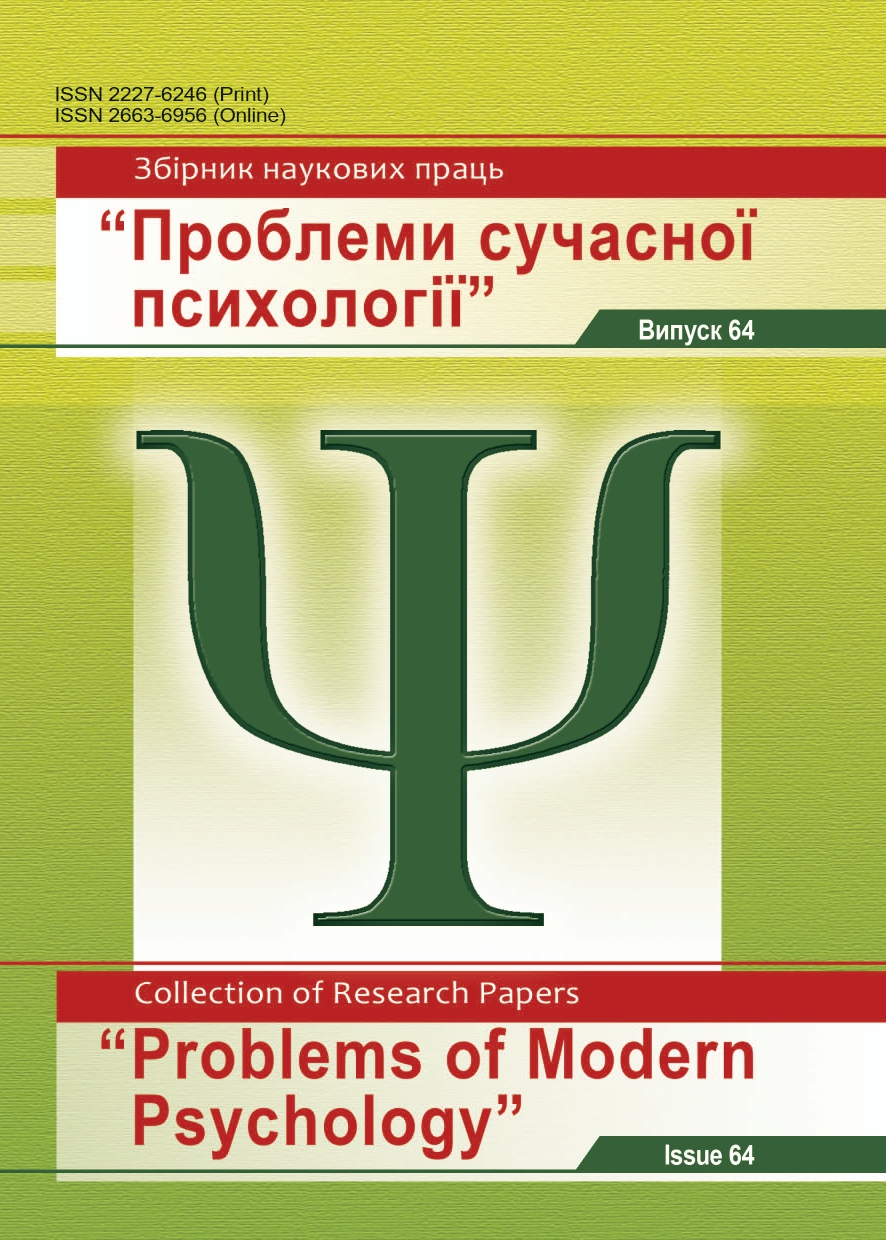Психологічні особливості посттравматичного стресового розладу учасників бойових дій у ситуації війни в Україні
DOI:
https://doi.org/10.32626/2227-6246.2024-64.91-114Ключові слова:
військовий стрес учасників бойових дій, посттравматичний стресовий розлад, хронічний, аспекти життя учасника бойових дій, робота, діяльність, міжособистісні стосунки, фізичне здоров’я, самооцінка, функціональний стан психічної діяльності, надзвичайно сильні негативні емоції, тривога, страх, неабияка розумова і фізична втомаАнотація
Мета статті полягає у виявленні психологічних особливостей посттравматичного стресового розладу учасників бойових дій.
Методи дослідження. Для розв’язання поставлених завдань використовувалися такі теоретичні методи дослідження: категоріальний, структурно-функціональний, аналіз, систематизація, моделювання, узагальнення. Експериментальним методом є метод організації емпіричного дослідження.
Результати дослідження. Показано, що посттравматичні стресові розлади виникають у комбатантів як відстрочена чи достатньою мірою лонгітюдна реакція на психотравмувальну стресову подію або ситуацію виключно загрозливого чи смертельного характеру (бойові дії, спостереження за насильницькою смертю інших, роль жертви катувань, перебування у полоні та ін.). Доведено, що за своєю суттю посттравматичний стресовий розлад є так званою відповідною реакцією психіки військовослужбовця на досить-таки потужні емоційні подразники, стресової ситуації, які відбуваються.
Висновки. Доведено, що ситуації бойових дій, які мають місце на сході України, нерідко призводять до експліцитних змін функціонального стану психічної діяльності військовослужбовця. Ця ситуація нерідко характеризується розвитком надзвичайно сильних негативних емоцій, таких як тривога, страх, важка розумова і фізична перевтома. При цьому у разі переходу військовослужбовця до мирної діяльності часто не дозволяє комбатантам адекватно реагувати на ті чи інші обставини навколишньої дійсності. Посттравматичний стресовий розлад при цьому набуває так званого хронічного перебігу, хронічної форми, і торкається майже кожного аспекту життя комбатанта, включаючи роботу, міжособистісні взаємостосунки, фізичне здоров’я, самооцінку.
##submission.downloads##
Опубліковано
Як цитувати
Номер
Розділ
Ліцензія
Авторське право (c) 2024 Харченко Євген, Онуфрієва Ліана

Ця робота ліцензується відповідно до Creative Commons Attribution-NonCommercial 4.0 International License.
Редакція має повне право публікувати у Збірнику оригінальні наукові статті як результати теоретичних і експериментальних досліджень, які не знаходяться на розгляді для опублікування в інших виданнях. Автор передає редколегії Збірника права на розповсюдження електронної версії статті, а також електронної версії англомовного перекладу статті (для статей українською та російською мовою) через будь-які електронні засоби (розміщення на офіційному web-сайті Збірника, в електронних базах даних, репозитаріях та ін).
Автор публікації зберігає за собою право без узгодження з редколегією та засновниками використовувати матеріали статті: а) частково чи повністю в освітніх цілях; б) для написання власних дисертацій; в) для підготовки абстрактів, доповідей конференцій та презентацій.
Автор публікації має право розміщувати електронні копії статті (у тому числі кінцеву електронну версію, завантажену з офіційного web-сайту Збірника) на:
- персональних web-ресурсах усіх Авторів (web-сайти, web-сторінки, блоги тощо);
- web-ресурсах установ, де працюють Автори (включно з електронними інституційними репозитаріями);
- некомерційних web-ресурсах відкритого доступу (наприклад, arXiv.org).
Але в усіх випадках обов’язковою є наявність бібліографічного посилання на статтю або гіперпосилання на її електронну копію, що містяться на офіційному сайті Збірника.






